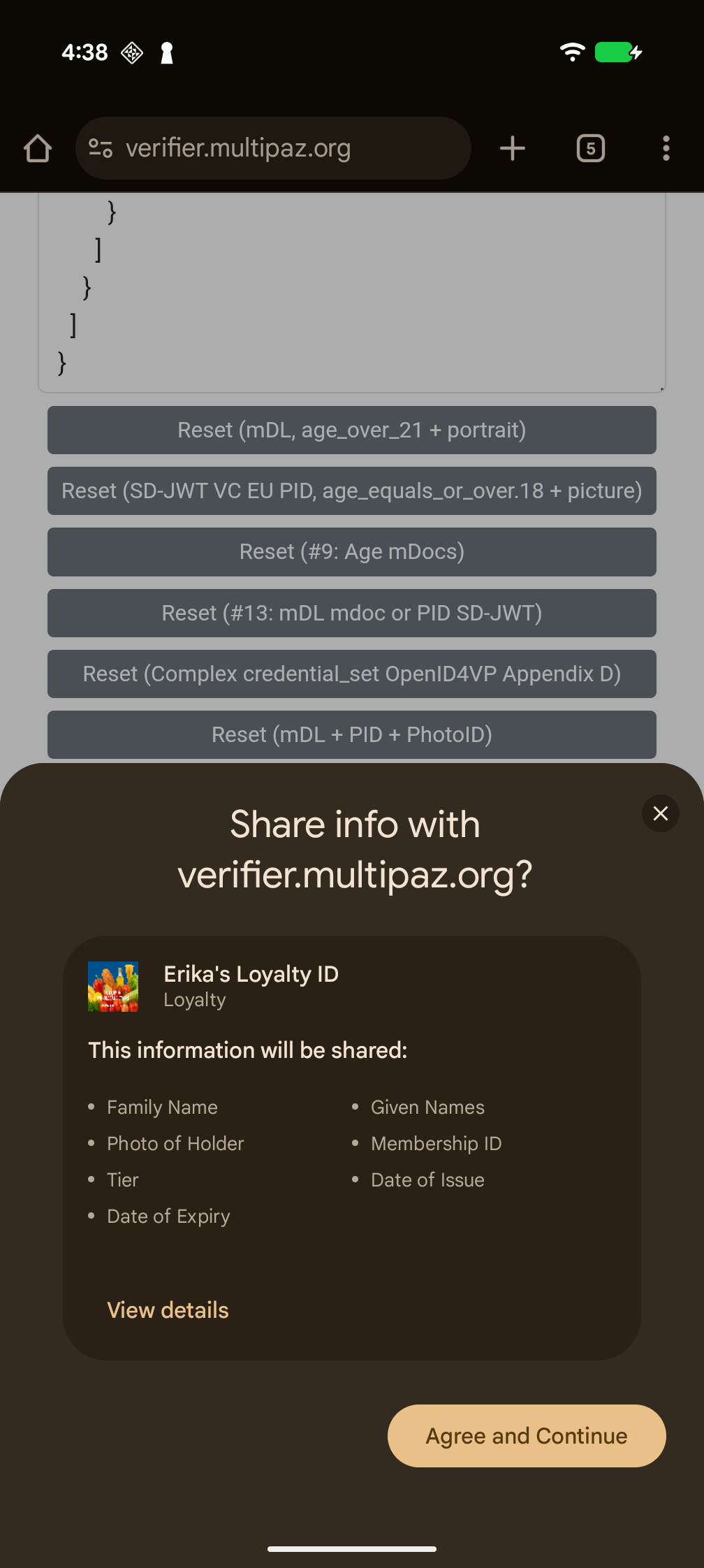Request Multiple Credentials with DCQL
Overview
DCQL (Declarative Credential Query Language) is a JSON-based query language used to request specific credentials and claims from a digital wallet. This tutorial will guide you through creating DCQL queries, with a practical example using a Loyalty credential.
What is DCQL?
DCQL allows verifiers to specify:
- Which credential types they accept (e.g., mDL, PID, Loyalty)
- Which specific claims they need from each credential
- How credentials can be combined (AND/OR relationships)
How to Use DCQL Queries
To test DCQL queries in practice, follow these steps:
-
Install TestApp from the website. Open TestApp, click Document Store then click “Create Test Documents in Platform Secure Area” to make sure you have credentials on the device.
-
Open the website verifier.multipaz.org in your browser
-
Click the "Raw DCQL" button
-
Input your DCQL JSON query. For example, to query a Loyalty credential:
{
"credentials": [
{
"id": "loyalty",
"format": "mso_mdoc",
"meta": {
"doctype_value": "org.multipaz.loyality.1"
},
"claims": [
{
"path": ["org.multipaz.loyality.1", "family_name"]
},
{
"path": ["org.multipaz.loyality.1", "given_name"]
},
{
"path": ["org.multipaz.loyality.1", "portrait"]
},
{
"path": ["org.multipaz.loyality.1", "membership_number"]
},
{
"path": ["org.multipaz.loyality.1", "issue_date"]
},
{
"path": ["org.multipaz.loyality.1", "expiry_date"]
}
]
}
]
}
-
Select the protocol (default: "W3C DC API (OpenID4VP 1.0)")
-
Click the "Request" button
This will query the loyalty credential from your device and request the specified claims.
It will popup Loyalty Credential just like below:

Basic Structure
Every DCQL query has this basic structure:
{
"credentials": [ ],
"credential_sets": [ ]
}
Where:
credentials: Array of credential queriescredential_sets: Optional field that defines AND/OR logic
Step 1: Define a Single Credential Query
Let's start with a simple query for a Loyalty credential.
The Loyalty credential type in Multipaz uses the document type org.multipaz.loyality.1.
{
"credentials": [
{
"id": "loyalty",
"format": "mso_mdoc",
"meta": {
"doctype_value": "org.multipaz.loyality.1"
},
"claims": [
{
"path": ["org.multipaz.loyality.1", "membership_number"]
}
]
}
]
}
Key Components:
- id: A unique identifier for this credential query (used in credential_sets)
- format: "mso_mdoc" for ISO mdoc credentials
- meta.doctype_value: The document type identifier
- claims: Array of claims to request, each with a path array containing [namespace, claim_name] verifier.js:138-165
Step 2: Request Multiple Claims
The Loyalty credential supports several claims. You can query different attributes by adding items in claims. Here's a comprehensive query:
{
"credentials": [
{
"id": "loyalty",
"format": "mso_mdoc",
"meta": {
"doctype_value": "org.multipaz.loyality.1"
},
"claims": [
{
"path": ["org.multipaz.loyality.1", "family_name"]
},
{
"path": ["org.multipaz.loyality.1", "given_name"]
},
{
"path": ["org.multipaz.loyality.1", "portrait"]
},
{
"path": ["org.multipaz.loyality.1", "membership_number"]
},
{
"path": ["org.multipaz.loyality.1", "issue_date"]
},
{
"path": ["org.multipaz.loyality.1", "expiry_date"]
}
]
}
]
}
Step 3: Combining Multiple Credentials
OR Relationship (Either/Or)
To accept either an mDL or a Loyalty credential, in options of credential_sets, add id separately to create a Either/or relationship in query.
{
"credentials": [
{
"id": "mdl",
"format": "mso_mdoc",
"meta": {
"doctype_value": "org.iso.18013.5.1.mDL"
},
"claims": [
{
"path": ["org.iso.18013.5.1", "given_name"]
},
{
"path": ["org.iso.18013.5.1", "family_name"]
}
]
},
{
"id": "loyalty",
"format": "mso_mdoc",
"meta": {
"doctype_value": "org.multipaz.loyality.1"
},
"claims": [
{
"path": ["org.multipaz.loyality.1", "given_name"]
},
{
"path": ["org.multipaz.loyality.1", "family_name"]
}
]
}
],
"credential_sets": [
{
"options": [
["mdl"],
["loyalty"]
]
}
]
}
AND Relationship (Both Required)
To require both an mDL and a Loyalty credential, in options of credential_sets, add ids create a AND relationship in query. If one if the ids doesn’t exist it will show “No ID found”:
{
"credentials": [
{
"id": "mdl",
"format": "mso_mdoc",
"meta": {
"doctype_value": "org.iso.18013.5.1.mDL"
},
"claims": [
{
"path": ["org.iso.18013.5.1", "portrait"]
}
]
},
{
"id": "loyalty",
"format": "mso_mdoc",
"meta": {
"doctype_value": "org.multipaz.loyality.1"
},
"claims": [
{
"path": ["org.multipaz.loyality.1", "membership_number"]
}
]
}
],
"credential_sets": [
{
"options": [
["mdl", "loyalty"]
]
}
]
}
Step 4: Optional Credentials
You can make credential sets optional using the required field inside the credential_sets array object.This query requires an mDL but optionally accepts a Loyalty credential if available.
{
"credentials": [
{
"id": "mdl",
"format": "mso_mdoc",
"meta": {
"doctype_value": "org.iso.18013.5.1.mDL"
},
"claims": [
{
"path": ["org.iso.18013.5.1", "given_name"]
}
]
},
{
"id": "loyalty",
"format": "mso_mdoc",
"meta": {
"doctype_value": "org.multipaz.loyality.1"
},
"claims": [
{
"path": ["org.multipaz.loyality.1", "membership_number"]
}
]
}
],
"credential_sets": [
{
"required": true,
"options": [
["mdl"]
]
},
{
"required": false,
"options": [
["loyalty"]
]
}
]
}
Conclusion
DCQL (Declarative Credential Query Language) provides a powerful, JSON-based approach to digital credential verification. This tutorial demonstrated how DCQL enables verifiers to precisely request specific credentials and claims through structured queries. Key Benefits:
- Precision: Request exactly the claims needed
- Flexibility: Support OR/AND relationships between credentials
- Privacy: Enable selective disclosure of information
- Interoperability: Standardized across different credential types
Practical Implementation:The tutorial showed hands-on examples using verifier.multipaz.org, from simple single-credential queries to complex multi-credential scenarios with optional requirements. DCQL represents a significant advancement in digital identity verification, offering a robust foundation for building efficient, privacy-preserving, and user-friendly credential systems. As digital identity ecosystems continue to evolve, DCQL provides the flexibility and precision needed for modern verification requirements.